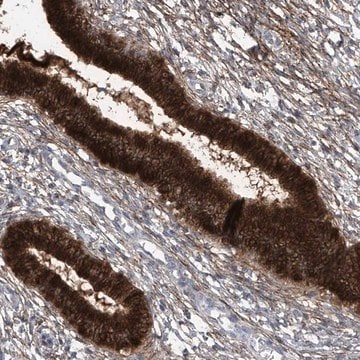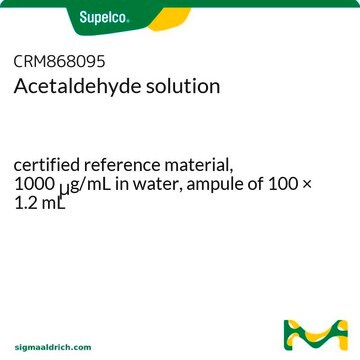868095
Acetaldehyde solution
1000 μg/mL in H2O, analytical standard
About This Item
Produtos recomendados
grau
analytical standard
Certificado de análise (CofA)
certificate of analysis is enclosed in each package.
embalagem
ampule of 100 × 1.2 mL
concentração
1000 μg/mL in H2O
técnica(s)
HPLC: suitable
gas chromatography (GC): suitable
densidade
0.868 g/mL at 20 °C
Formato
single component solution
temperatura de armazenamento
2-8°C
cadeia de caracteres SMILES
[H]C(C)=O
InChI
1S/C2H4O/c1-2-3/h2H,1H3
chave InChI
IKHGUXGNUITLKF-UHFFFAOYSA-N
Procurando produtos similares? Visita Guia de comparação de produtos
Aplicação
Outras notas
substituído por
Palavra indicadora
Danger
Frases de perigo
Declarações de precaução
Classificações de perigo
Carc. 1B
Código de classe de armazenamento
6.1D - Non-combustible acute toxic Cat.3 / toxic hazardous materials or hazardous materials causing chronic effects
Classe de risco de água (WGK)
WGK 3
Ponto de fulgor (°F)
Not applicable
Ponto de fulgor (°C)
Not applicable
Equipamento de proteção individual
Eyeshields, Gloves
Escolha uma das versões mais recentes:
Já possui este produto?
Encontre a documentação dos produtos que você adquiriu recentemente na biblioteca de documentos.
Nossa equipe de cientistas tem experiência em todas as áreas de pesquisa, incluindo Life Sciences, ciência de materiais, síntese química, cromatografia, química analítica e muitas outras.
Entre em contato com a assistência técnica









